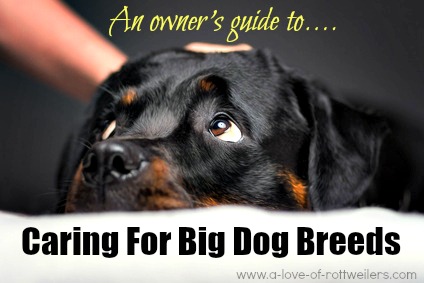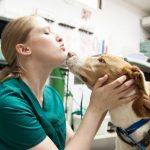In This Article You Will Read About
All dogs are NOT the same, and caring for big dog breeds has a whole range of unique challenges. But the rewards are big too!
Two areas in which large breeds have very unique needs are nutrition and health issues, and these are actually closely related.
Big dogs need a certain amount of space (but not as much as you might think), enough exercise, proper training and socialization and more.
They also need the ‘XL’ size of just about everything… so make sure your budge allows for that!
Nutrition For Big Dog Breeds
One of the most important parts of caring for big dog breeds is making sure that you give them the right kind of nutrition.
Large and giant dog breeds have very specific dietary requirements and giving them a food that isn’t specifically designed to meet those needs can result in some serious health issues.
Getting it ‘just right’ is vitally important during the puppy and adolescent stages, as this is when the groundwork for your dogs future health and wellbeing is laid.
During this critical period, it’s so important to get the correct ratio of protein, fat and calcium.
It’s also important to feed your pup the right amount of food, and make sure he gets enough exercise so that his food ‘goes to work’!
Here are some quick guidelines…..
- It must be a Holistic or Premium dog food (this is determined by the quality of the ingredients)
- Have USDA-approved, organic, natural or human-grade ingredients.
- Probiotics, minerals and vitamins are helpful.
- You want to see at least two sources of high-quality protein.
When it comes to protein, fat, calcium and calories, the AAFCO doesn’t offer any formal recommendations for foods specifically designed for large breed adult dogs….
…. but I’d suggest aiming for a food that contains approx. 20 – 25% protein, and 11 – 14% fat.
If you’re feeding a large breed puppy, check out my Best Large Breed Puppy Food page to learn more about the ingredients and formulas you need to be looking for.
If your dog has itchy skin or ears, or suffers from allergies, his food could be to blame. Dog food allergies are much more common than most dog owners realize.
Yeast infections (which also cause red, irritated or itchy skin) is often also a result of a dietary imbalance or a reaction to certain dog food ingredients.
Choosing a hypoallergenic dog food can eliminate these issues, so if you think your Rottie, or other large breed, might be having some allergy problems take a closer look at his diet.
Once you’ve chosen the best possible food for your big dog, it’s also a good idea to pay attention to the type of bowl you offer it in.
Although there is no definitive proof that using elevated dog bowls can help prevent canine bloat (see info.on this condition below), they can make mealtimes more comfortable for big dogs.
Eating out of a raised dog bowl means that your large breed puppy or dog doesn’t have to splay his front legs, or bend or stretch awkwardly to reach down to his food.
This can help prevent or alleviate pain from bone and joint issues such as arthritis or panosteitis.
Common Health Problems In Big Dog Breeds
There are several health problems that affect large and giant breed dogs far more often than their more moderately-sized ‘relatives’.
Many of these are bone/joint problems, and being proactive with dog joint health is especially important in large dog breed care.
Other dog health issues that you may come across when caring for big dog breeds are bloat (also known as ‘torsion’ or gastric dilatation volvulus – GDV), canine allergies, and heart problems.
Let’s take a closer look at some of them:
Canine Bloat
Bloat is most common in large, deep-chested breeds such as Great Danes, but it can occur in any breed.
There are several different factors that can cause bloat, including:
- Swallowing too much air (can happen when a dog eats too fast)
- Eating too much
- Exercising too strenuously within an hour of eating
Linda Arndt (aka ‘The Great Dane Lady’) is an expert in large breed nutrition, and it’s with her full permission that I’ve shared some of her knowlege on this page.
Linda tragically lost one of her beloved Great Danes to this condition, and her personal experience has led her to be very active in her research and committed to reducing the number of dogs that suffer (and often die) from bloat every year.
She believes that you can add other ‘bloat triggers’ to this list. They include:
- Poor stress-coping mechanism or immune system
- Certain antibiotics and medications
- An inadequate or inappropriate diet
A poor/inappropriate diet can cause an overgrowth of fungus or toxins in a dogs digestive system, which can lead to a build up of too much ‘gas’ which leads to bloat.
Regardless of whether or not your dog is above average in size, every dog owner needs to know how to recognize the symptoms of canine bloat. It could literally save your dog’s life one day.
Make sure you’ve got your dog’s back by checking out this page… All About Canine Bloat. If this condition strikes, you won’t have much time, so be prepared and protect your dog.
Joint Health In Large Breeds
Caring for big dog breeds properly means that keeping their bones and joints healthy is your responsibility… and it starts in puppy-hood.
Feeding your pup the right diet plays a huge role in this, and I’ve discussed that above and on my Best Puppy Food page.
It’s also hugely important to know what symptoms could spell trouble, and what else you need to do to avoid growth problems, injuries etc.
There is a genetic component in dog bone/joint problems, and to make sure your pup has the best possible chance of growing up with strong, healthy bones make sure that you pick a pup from a reputable breeder who has had all the appropriate health screenings done on their breeding stock.
That way your pup is less likely to inherit a problem such as hip dysplasia (but there’s no such thing as a 100% guarantee on this!).
Using a puppy food that is formulated for large breed puppies will help to prevent the too-rapid growth that can result in Panosteitis or other conditions such as Hypertrophic Osteodystrophy (HOD), Osteochondritis Dissecans (OCD), Hip and Elbow Dysplasia and more.
When caring for big dog breeds, avoid strenuous exercise, running (or even too-long walks) on hard surfaces such as concrete/asphalt until your pup has matured.
Also, never allow your pup to jump up or down from any sort of height – for example into or out of a pick-up truck, on or off the sofa/bed, over walls etc.
Signs of bone problems such as the ones I’ve mentioned above can include:
- Limping or lameness in one, or several, legs
- Tenderness in/around ‘knees or ankles’ (Pano), or in the shoulders/elbows (OCD)
- Swelling of the joints (possibly arthritis)
- Hips that make a ‘clicking’ sound as the dog walks
- Stiffness/weakness in the rear legs
- Clumsy or wobbly gait
These last 3 symptoms could be signs of hip dysplasia in breeds such as Rottweilers, German Shepherds, Labrador Retrievers, Golden Retrievers and other large breeds.
They could also be signs of Wobblers Syndrome, in Great Danes, Dobermans and other susceptible breeds)
Dog joint support supplements can help reduce inflammation, pain and stiffness from arthritic type conditions, and are definitely worth investigating if you have a big dog who’s getting on in years.
Some of them are formulated to protect joints from damage and can be used as a preventative measure when given regularly.
Allergies & Yeast Infections In Dogs
If you are caring for big dog breeds, chances are you will come across what appears to be canine allergies at some point.
Many large breeds do seem to be predisposed to allergic reactions or are particularly sensitive to certain allergy ‘triggers’.
Rottweilers can suffer from canine skin allergies (caused by fleas, contact with an allergen, dog food allergies and so on) and seasonal allergies that cause eye/ear problems.
Certain breeds are prone to having a severe allergic reaction to some puppy vaccinations.
These specifically include (but are not limited to) Miniature Dachshunds, West Highland White Terriers, Old English Sheepdogs, Akitas, Portuguese Water Dogs, Weimaraners, and Harlequin Great Danes.
The vaccines that are most likely to produce a reaction include (but are not limited to) Rabies, Parvo and Leptospirosis.
Identifying the ‘trigger/s’ and then eliminating them, while treating the dog to relieve the initial itching and discomfort associated with allergies is usually effective in eliminating, or at least significantly reducing, the problems.
Again, feeding a premium dog food that has the correct nutritional balance goes a long way towards preventing canine allergies.
Dog Allergy Supplements can play an important role in detoxifying your dogs’ system, and can help prevent allergic-type responses to vaccinations and so forth.
Sometimes what looks like an allergy problem can be caused by a yeast infection.
Here are some of Linda Arndt’s suggestions for helping protect your dog from developing this problem:
Feed a premium, multiple protein based dog food
Avoid generic dog food brands and grain-free formulas
Choose a food which contains probiotics, or add canine probiotics to his diet.
Canine Heart Problems & Heart Failure
Another canine health issue that you may come across when caring for large breed dogs are heart problems, particularly canine congestive heart failure.
Statistics show that roughly one in every ten dogs will suffer from heart failure, and Rottweilers are that suffer from a congenital (inheritable) canine heart condition called Sub Aortic Stenosis – but it’s by no means limited to Rotties I’m afraid.
Dilated Cardiomyopathy (DCM) is another heart condition that affects many large/giant breeds have
You can read more about canine heart disease on my Canine Congestive Heart Failure page. It’s more MUST-READ stuff for all dog owners.
There are all sorts of things that can cause canine heart disease, from a genetic weakness, to illness or poor nutrition, obesity and more.
Supplements such as Omega-3 Fish Oils, the amino acids Taurine and L-Carnitineand certain Vitamin/Mineral Supplements can be very beneficial, and may help prevent your dog from experiencing cardiac problems during his lifetime.
The Best Toys & Supplies For Big Dog Breeds
Big dogs don’t really need different types of supplies, equipment or toys, they just need bigger sizes!
Of course, a large breed dog is going to be stronger, and have a greater ability to cause damage, than a tiny one. Bear this in mind when choosing toys in particular.
In general it pays to buy the larger size in toys, beds, treats and so on. For adult dogs who are large, or X-Large, the giant-sized crates are best.
BUT for large-breed puppies, a crate still needs to be only just big enough for them to use (see my Puppy Crate Training page for more info. on this) or you’ll find it very difficult to potty train successfully.
Once your dog has grown up, that’s when to buy him his huge crate!
Big dogs have big jaws, and choosing toys that are sturdy enough to stand up to the wear and tear is important for his safety.
My Tough Dog Toys page features some of the very best, and virtually indestructible, dog toys on the market. Don’t miss it, you’ll find exactly what your big ‘un needs right there.
Related Pages


